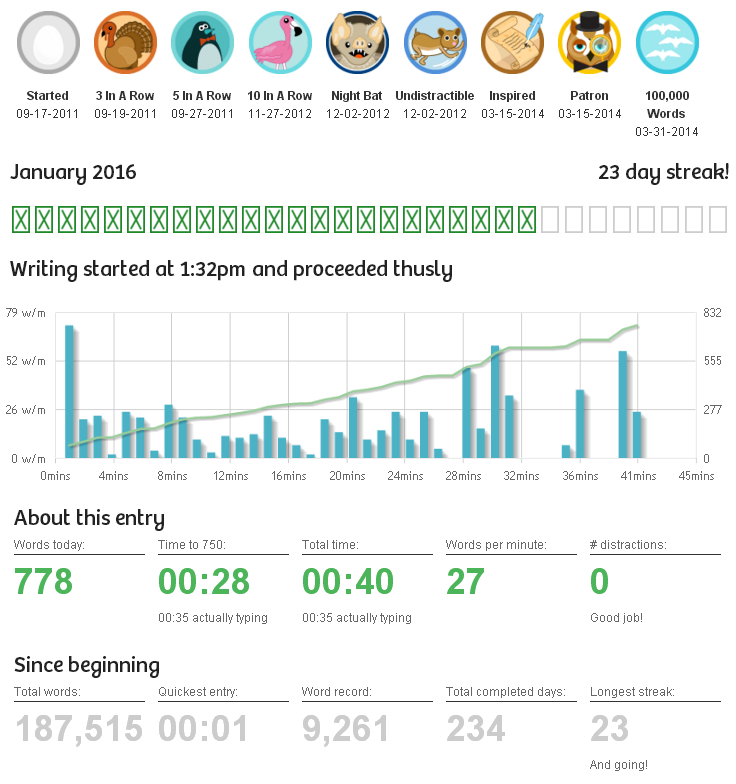Rules of Journal Writing Learned After 5 Years
Table of Contents:

A Case Study
First off, full disclosure that I personally love the idea of personal journal-keeping. In the field of writing, I don’t think it gets nearly as much recognition as it should. Though I’m going to try my best to avert my bias and presume I’m in the minority.
But my own writing is so chicken-scratch that I never found physically keeping a diary as viable. As an alternative, I’ve tried a variety of different apps instead. These include Penzu, Day One and Journey.
While I enjoy their design and functionality, what I’ve always come back to for the past five years is 750words. What differentiates it is how it’s modeled around the gamification of the writing process. It keeps a stark and obvious track of your progress and emphasizes the importance of writing every day. In addition to this, I can’t help but use it for the fact that the majority of my entries are exclusively on it, and it has a fairly decent search and export system.

But I’m not going to hide the fact that I am indeed not an elite power-user of the website. In fact, I’d confess that I’m more of a failure of a journal-keeper rather than anything.
A prominent feature on 750words is the One-Month Challenge, wherein you challenge yourself to write daily for the entire month without missing a day.
I have signed up for the monthly challenge 20 times so far. I have failed it 20 times.
According to the official statistics, I’ve only written on three days out of every twenty, or 15% my total time on the website. In my defense, I did start using the website when I was 15 years-old. And it’s become abundantly clear to me that we’ve created a well-oiled system of making sure kids around this age have their stalwart attention spans placed elsewhere.
Admittedly, until only a few months ago I found it difficult to keep up a streak. I’ve found the solution slowly, by sitting down and figuring out the purpose of why I want to write. And then, by following it, I’ve found myself on my longest streak so far. But more than that, I find it easy and enjoyable to write every day now.
And I wanted to share them with you.
But before I get into that, I want to argue the importance of having a journal — and writing in it daily — in the first place.
Why Journal Anyways?
We always aim for amazing writing—we expect that we’re going to sit down and have something incredible. One of the most important things to learn is that this is simply impossible.
There were a lot of lessons that I learned from Bird by Bird by Anne Lamott, even as somebody that writes essays rather than fiction. (As an aside: I like to think the badges on 750words were inspired by the title.) One of the most prominent things I learned was about how to find the ‘interesting stuff’. How you’ll probably need to write six pages before stumbling on a paragraph you actually like.
The point is that it’s all in hindsight, that you need to go somewhere in order to see how far you’ve come. There should never be any expected instant gratification when it comes to writing.
Writing a first draft is very much like watching a polaroid develop.
By writing every day — even about the ‘boring stuff’—you’ll eventually come across an epiphany you wouldn’t have had otherwise. Imagine each individual entry as a seed; many might not fully bloom, or even germinate, but you’ll still have a far bigger forest rather than if you just went straight for the jugular. You reap what you sow, after all.
The Rules
Metadata
Although at first it may seem trivial to care so much about organizing what you write, but as time goes on you’ll eventually have a large bulk of information. I can’t even recollect how much of my own writing I’ve lost from switching to a new computer or cloud service.
- Simplify with modules. Set up sections of journaling that are important, useful and specific. Some of the most popular ones are a gratitude journal or idea journal.
- Track thyself with meaning. Figure out what’s important to quantify, and quantify it often. Add a separate module for logs, like your fitness or emotional levels.
- Be consistent. Use the same file and folder system universally. Use the same modules and syntax universally.
- Redundantly backup everything. Print your entries, have a local USB drive of everything, a cloud backup and an online published website of your entries. There’s no such thing as too many backups.
- Keep a template. In order to kickstart your journal and properly utilize modules. Mine is constantly changing, but you can view it (and copy it) here.
- Learn and use** Markdown*.</b> It might be tempting to use a .doc* or a .odt when saving your work, but learning a simple markup language and saving your entries in plain text will save you a lot of space, compatibility and avoided corrupted files in the future.
Writing
- Write with meaning. Be mindful about what content you’re journaling about, don’t get caught up in meaningless minutia. Ask yourself “what will be important to look back on?”.
- Don’t ever self-censor. There’s no point of writing in a private journal if you’re not going to express your true feelings, your true self.
- Value positivity over negativity. That said, don’t let your emotions get the better of you. Don’t speak ill about people — especially those that care about you — unless you intend on burning it right after.
- Never be afraid of being honest. Understand that anybody could eventually read what you write.
- Always have your ego checked. Understand that nobody could read what you write. Don’t fabricate your grandiosity, be humble and kind.
- Follow the Zen. I was pretty surprised to discover how much of PEP 20 can be applied to writing, and I often keep it in mind.
- Open-source yourself. To continue to take influence from programming, be open to the idea of allowing your writing to the creative commons, so that future generations may be able to build on your ideas.
- Be wary of burnout. I confess that I won’t write 750 words a day, I found that attempting too was one of the main causes of me skipping so many days. They say that you should practice in small doses rather than large, sporadic bursts. I think the same can be said about writing.
- Love your past self. It’s safe to say that there’s a universal feeling of cringing when you read your past work. How naïve you were, how silly you thought your opinions were. But it’s essential to get past this and treat yourself with empathy.
- Accumulate and review. Once you’re able to look at your previous entries without burning them, it’s a good idea to look at them on a weekly or monthly basis. Take the highlights from them and maybe start a review to see how far along you’re coming
An Enticing Disclaimer
These are just my own personal beliefs. I think it’s important for me to say you shouldn’t take them or anyone else as dogma. Feel free to pick and choose what you think would work for you. Even add your own and make your own article based off of this one, it’s no skin off of my teeth.
Further Readings
Why Keeping a Daily Journal Could Change Your Life — Benjamin Hardy
Journal Examples — Penzu
Why Keep a Journal? — Memento
Five Great Published Diaries — Craig Brown